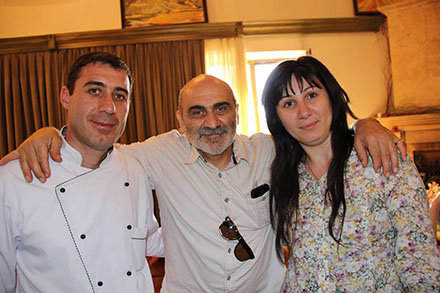Rural Armenians who are self-employed on their farms and gardens face a number of difficulties connected with livestock, breeds, land cultivation, irrigation systems, animal productivity, access to the markets and more. Families without livestock and land face an even larger issue: unemployment. Heifer has been addressing these issues and striving to find solutions since 1999.
Learn more about Heifer’s work in Armenia.
The unemployment rate in Armenia is very high, especially in rural communities. Armenians who own a piece of land or some kind of livestock do their best to generate income to make ends meet. For the unemployed, however, migration is a common solution. Many of the people, especially men, migrate to find work in order to feed their families. Other families turn to self-employment in order to stay in their native land, invest in their communities and contribute to the economic growth of their village.
Yura Sargsyan from Tsaghkunk village in the Gegharkunik region of Armenia is one of those men who do their best to contribute to the prosperity of their family and the community. Yura is an award-winning chef who is skilled in cooking and food design. He is also famous for preserving the traditional elements of Armenian cuisine. Yura prepares dishes that are popular in Armenia and abroad, where he worked for several years. He has worked as a chef in numerous restaurants frequented by celebrities, political figures and well-known businessmen.
Despite his success, Yura decided to return and invest in his native country. In 2011, he started a business in Tsaghkunk, building a guesthouse to host tourists who came to taste his food. He got the idea when he and his wife stayed in a guesthouse in Cyprus. Seeing that the owners did everything by themselves, Yura thought, "Why not me? And why not in Tsaghkunk, my native village?"
Yura renovated his uncle's old house to create the guesthouse. Tourists come every year to stay and Yura knows how to keep them coming back to Tsaghkunk again and again. Yura credits the tasty dishes that he cooks as well as the peaceful atmosphere that keeps tourists coming back.
In addition to running his guesthouse and cooking, Yura participates in the Promoting Innovative Rural Tourism (PIRT) project funded by the European Union and implemented by Heifer Armenia in cooperation with partners from Georgia, Turkey and Bulgaria. Yura's Tsaghkunk guesthouse is on the list of PIRT’s local service providers and is a great example of how rural tourism can be a successful option to foster the local economy.

"By running a guesthouse, I am not only bringing tourists into my village, but I am helping the local villagers as well," Yura explains. "Family environment and ecologically clean food are the basic principles in my guesthouse. I also work with villagers by allocating the orders for their work. Each year I take eight or 10 young people to help me in the kitchen. They are learning and getting acquainted with cooking. This could help them to choose the right profession."
Yura also tries to purchase everything he can from the local people. "Only Grandma Arevhat provides the freshly baked lavash (Armenian bread) to the guesthouse." Yura says. "Our co-villager, Mrs. Gayane, prepares the homemade juices, nectar, jam and other preserves. Another neighbor, Granny Anahit, makes cheese, and Mrs. Susanna provides eggs and chickens." Other families help by collecting thyme and mint from the mountains and packaging them as souvenirs.
When the number of the guests in his guesthouse exceeds the number of rooms available, Yura sends them to stay with other families in the village. This is an additional way for the families in Tsaghkunk to earn money and take care of their expenses. This practice has fostered the establishment of six new bed-and-breakfast establishments in Tsaghkunk.
"I send about 10-15 guests monthly to each of the six guesthouses owned by the villagers," Yura says. "They earn $10-15 per day from each guest."
Yura participated in a number of trainings through the PIRT project, including Business Plan Writing, Business Development and Management, Rural Tourism Value Chain and Management of Small and Medium Enterprises.
"By participating in the trainings I made some significant changes in our marketing strategy," Yura explains. "Now we offer open-air receptions in remote areas in our mountains where the flowers bloom. It is incredibly beautiful. We can make every guest's dream come true! I hope to make the whole world aware of my village and its surroundings."
Yura also participated in a study tour to Bulgaria through PIRT and will be on an exchange visit to Georgia in mid-September to share his knowledge and learn from the Georgian partners. Yura sees great value in sharing his knowledge with others and believes that innovation is the foundation of sustainability.
Yura is constantly expanding his business by diversifying its services, organizing and participating in various culinary festivals in Armenia and abroad. He is proud of the fact that the guesthouse is located in his native village and serves as an entertainment place for community. He is plans to invest more to contribute to the further development of Tsaghkunk for the well-being and prosperity of the local people.
Learn more about how you can support families like those in the village of Tsaghkunk.
Story courtesy of Heifer Armenia
Photos courtesy of Yura Sargsyan